Turkish Navy
| Turkish Naval Forces Türk Deniz Kuvvetleri |
|
|---|---|
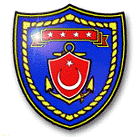 Seal of the Turkish Navy |
|
| Active | |
| Country | |
| Allegiance | Ministry of National Defence |
| Branch | Navy |
| Role | National Defense |
| Size | 48,600 personnel[1] 75 aircraft 19 Frigates 7 Corvettes 14 Submarines 108 Fast Attack Craft |
| Part of | Turkish Armed Forces |
| Colors | Blue, White & Gold |
| Commanders | |
| Commander of the Turkish Naval Forces | Eşref Uğur Yiğit |
The Turkish Navy (Turkish: Türk Deniz Kuvvetleri) is a branch of the Turkish Armed Forces.
The Turkish Navy has historically been one of the largest sea powers of the Mediterranean. Following the demise of the Ottoman Empire in the aftermath of World War I, and the establishment of the modern Republic of Turkey in 1923 with the victory of Turkish revolutionist forces under Mustafa Kemal Atatürk at the Turkish War of Independence, the Turkish Navy, which inherited the remaining warships of the former Ottoman fleet, underwent a structural reformation and modernization.
Today, the Turkish Navy ranks eighth in the world in terms of staff, with 51,000 active personnel;[2] and third largest in Europe in terms of the displacement of the total fleet, with 258,948 tons.[3][4][5]
Contents |
History
- Main article: History of Turkish navies
Ship and submarine classes of the Turkish fleet since 1923


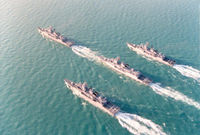
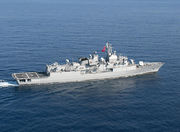
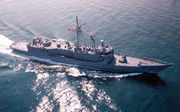
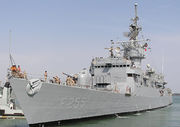



Interwar years
During the years of Atatürk's presidency, the major surface combatants of the former Ottoman fleet, including warships like the battlecruiser Yavuz, the pre-dreadnought battleship Turgut Reis, protected cruisers Hamidiye and Mecidiye, light cruisers Berk-i Satvet and Peyk-i Şevket, destroyers Samsun, Bafra and Taşoz, and torpedo boats Burak Reis, Kemal Reis, İsa Reis and Sakız were overhauled, repaired and modernized.
However, the ageing warships inherited from the Ottoman Navy were mostly built and commissioned before the First World War, and technological improvements in naval warfare had left the Turkish Navy outdated in terms of equipment. To remedy this setback, the government of the Republic of Turkey embarked on a modernization program. First to be ordered were the two new submarines derived from the German Type UB III[6] and built by the German-owned Dutch shipyard IvS in 1925, being commissioned as the Birinci İnönü and İkinci İnönü in 1928. These were swiftly followed by an order for two Monfalcone class submarines[7] from Italy in 1930, named Sakarya and Dumlupınar, which were commissioned in 1931 after an extremely fast build time. The Navy also ordered four destroyers and three torpedo boats from Italian shipyards; namely the two Adatepe class destroyers (Adatepe and Kocatepe), the two Tınaztepe class destroyers (Tınaztepe and Zafer), and the three torpedo boats (Martı, Denizkuşu and Doğan), which were all commissioned in 1931. The Spanish-designed submarine Gür was laid down in 1930 and commissioned in 1936. Atatürk also ordered the Ay-class submarines, which were designed by the German shipbuilding company Krupp Germaniawerft and built in the shipyards of Istanbul and Gölcük in Turkey. Yıldıray was laid down in 1936, but its commissioning was delayed until 1946 due to the hardships of the Second World War. Saldıray was laid down in 1937 and commissioned in 1939, while Atılay was laid down in 1937 and commissioned in 1940.
World War II
Following the death of Atatürk in 1938 and during the Second World War years under the presidency of İsmet İnönü, the Turkish Navy purchased the Oruç Reis class submarines which were designed and built by the Vickers-Armstrong Shipbuilders in England. Murat Reis and Oruç Reis were laid down in 1939 and commissioned in 1942, while Burak Reis-II was laid down in 1939 and commissioned in 1946. Turkey also purchased four destroyers and two minelayers from England in 1939. The four Demirhisar class destroyers were namely Gayret which was commissioned in 1940; and Demirhisar, Sultanhisar and Muavenet which were commissioned in 1941.
Post World War II
Immediately after the end of the Second World War and with the declaration of the Truman Doctrine, which was followed a few years later by Turkey's membership to NATO in 1952, the Turkish fleet acquired new warships and submarines from the United States. Four Balao class submarines built by the General Dynamics Electric Boat Company joined the Turkish fleet and were commissioned in 1948. They were given the names of the previous Turkish submarines like Birinci İnönü-II, İkinci İnönü-II, Sakarya-II and Gür-II. These were followed by the three GUPPY class submarines, namely Piri Reis and Hızır Reis which were commissioned in 1960, and Turgut Reis-II which was commissioned in 1973; the GUPPY IA class submarine Dumlupınar-II which was commissioned in 1972, the seven GUPPY IIA class submarines which were commissioned between 1971 and 1973 and named as Burak Reis-III (1971), Uluç Ali Reis (1971), Murat Reis-II (1971), Cerbe (1972), Birinci İnönü-III (1972), Oruç Reis-II (1972) and Preveze (1973); the two GUPPY III class submarines which were commissioned in 1974 and named as Çanakkale and İkinci İnönü-III, and the two Tang class submarines which were commissioned in 1980 and 1983, and named as Piri Reis-II (1980) and Hızır Reis-II (1983).
Between 1949 and 1950, four U.S.-built Gleaves class destroyers were acquired; namely Gelibolu (D 360) and Giresun in 1949, and Gaziantep and Gemlik in 1950.
In 1959 four British-made M class destroyers joined the fleet, namely Alp Arslan, Kılıç Ali Paşa, Mareşal Fevzi Çakmak and Piyale Paşa.
Between 1967 and 1969, a total of five U.S.-built Fletcher class destroyers were acquired by the Turkish Navy; namely the İstanbul (D 340) and İzmir (D 341) in 1967, and the İçel (D 344), İskenderun (D 343) and İzmit (D 342) in 1969.
1970s
Starting from 1971, the Turkish Navy acquired a total of ten U.S.-built FRAM I Gearing class destroyers from the United States, namely Adatepe-II (D 353) (1971), Kocatepe-II (D 354) (1971), Tınaztepe-II (D 355) (1972), Gayret-II (D 352) (1973), Mareşal Fevzi Çakmak-II (D 351) (1973), Kocatepe-III (1974), Savaştepe (D 348) (1979), Piyale Paşa-II (D 350) (1980), Kılıç Ali Paşa-II (D 349) (1980) and Yücetepe (D 345) (1982). In 1981 and 1982, two Carpenter class destroyers joined the fleet, namely Anıttepe (D 347) (1981) and Alçıtepe (D 346) (1982). Carpenter class was a modified version of the Gearing class destroyer.
Turkish-built frigates Berk (D 358) and Peyk (D 359) joined the fleet in 1971 and 1972, respectively. They were named after the late Ottoman cruisers Berk-i Satvet and Peyk-i Şevket, which also served the fleet of the Turkish Republic in its early years.
Still in 1971 and 1972, two U.S.-built Allen M. Sumner class destroyers, Muavenet-II and Zafer-II, were acquired by the Turkish Navy.
Type 209 submarines
The Turkish Navy has 14 non-nuclear German-designed Type 209 submarines[8], which were built in Germany and Turkey. In the early 1970s, the Turkish Navy began ordering the Type 209 submarine Six Atılay class submarines (Type 209/1200) were laid down between 1974 and 1988, and commissioned between 1976 and 1990, as Atılay-II (S 347) (1976), Saldıray-II (S 348) (1977), Batıray (S 349) (1978), Yıldıray-II (S 350) (1981), Doğanay (S 351) (1984) and Dolunay (S 352) (1989). They were followed by the four Preveze class submarines (Type 209T1/1400) which were laid down between 1993 and 1998, and commissioned between 1994 and 1999, as Preveze-II (S 353) (1994), Sakarya-II (S 354) (1995), 18 Mart (S 355) (1998) and Anafartalar (S 356) (1999). The last four submarines, classified as the Gür class (Type 209T2/1400) were laid down between 2002 and 2006, and commissioned as Gür-III (S 357) (2003), Çanakkale-II (S 358) (2005), Burakreis-IV (S 359) (2006) and II. İnönü-IV (S 360) (2007). At present, the Turkish Navy operates the largest fleet of German-designed submarines in the world.
1980s
In 1983 two German-built Köln class frigates, namely Gelibolu-II (D 360) and Gemlik-II (D 361), joined the Turkish fleet.
During the modernization programme of the Turkish fleet in the mid 1980s, the first MEKO class frigates, designed by the German shipbuilding company Blohm + Voss and built in Germany and Turkey, were acquired. Four Yavuz class frigates (MEKO 200TN Track I) were built; namely Yavuz-II which was launched in 1985 and commissioned in 1987, Turgut Reis-III and Fatih which were launched in 1987 and commissioned in 1988, and Yıldırım which was launched in 1988 and commissioned in 1989.
1990s to 2000s
These were followed by the two Barbaros class frigates (MEKO 200TN Track IIA), of which Barbaros was launched in 1993 and commissioned in 1997, and Oruç Reis-III was launched in 1994 and commissioned in 1997. The final two ships are classified as the Salih Reis class frigates (MEKO 200TN Track IIB), of which Salih Reis was launched in 1997 and commissioned in 1998, and Kemal Reis-II was launched in 1998 and commissioned in 2000. These ships are equipped with the Mk.41 vertical launching system.
In the early 1990s Turkey acquired eight U.S.-built Knox class frigates. Muavenet-III, Zafer-III, Kocatepe-IV and Adatepe-III were commissioned in 1993, while Akdeniz, Trakya, Karadeniz and Ege were commissioned in 1994. Five ships of this class have been decommissioned between 2001 and 2005. Currently only Muavenet, Zafer and Karadeniz are still in active service.
In the late 1990s Turkey acquired eight Oliver Hazard Perry (G class) frigates from the United States. Gaziantep-II, Giresun-II and Gemlik-III were commissioned in 1998; Gelibolu-III and Gökçeada were commissioned in 1999; Gediz was commissioned in 2000; Gökova was commissioned in 2002; and Göksu was commissioned in 2003.
2000s
Between 2001 and 2003 a total of six French-built D'Estienne d'Orves class (B class) corvettes were acquired from France. Bozcaada was commissioned in 2001; Bodrum, Bandırma, Beykoz and Bartın were commissioned in 2002; and Bafra was commissioned in 2003.
On 26 July 2005, construction works of the first Milgem class corvette, Heybeliada, began at the Istanbul Naval Shipyard. A total of twelve Milgem class corvettes will be built for the Turkish Navy.
Two additional Kılıç-II class fast attack missile boats and three additional A class mine hunters are currently under construction.
Plans to build a total of four TF-2000 class AAW frigates,[9][10] the acquisition of a Landing Platform Dock (LPD)[11] and a total of six Type 214 AIP submarines[12][13] were approved by the Turkish Ministry of Defense on 12 December 2006. The RfI issued for the LPD project states that the requirement is for one LPD carrying 4 Landing Craft Mechanics (LCM), 27 Amphibious Assault Vehicles (AAV), 2 Landing Craft Personnel Vehicles (LCPV), 1 Commander Boat and 1 Rubber Hull Inflated Boat (RHIB). The Turkish Navy also plans to acquire 2 new Tank Landing Ships (LST),[14] 8 new Tank Landing Crafts (LCT),[15] 16 new Offshore Patrol Vessels (OPV) with ASW capability,[16] 2 new Rescue & Towing (R&T) ships,[17] and 1 new Submarine Rescue Mother Ship (MOSHIP).[18]
Structure
- Fleet Command
- Surface Action Group Command, Gölcük Naval Base, Kocaeli
- Submarine Group Command
- Fast Patrol Boat Group Command, Istanbul
- Mine Warfare Group Command, Erdek Naval Base, Balıkesir
- Logistic Support Group Command, Gölcük Naval Base, Kocaeli
- Naval Aviation Group Command, Cengiz Topel Naval Air Station, Kocaeli
- Northern Sea Area Command, Istanbul
- Istanbul Strait Command
- Çanakkale Strait Command
- Naval Hydrography and Oceanography Division Command
- Naval Museum Command, Istanbul
- Southern Sea Area Command, İzmir
- Naval infantry Brigade Command, Foça
- Amphibious Group Command, Foça
- Naval infantry Battalion Command, İzmir
- Accompaniment and Patrol Boats Flotilla
- Aksaz Naval Base Command, Aksaz Naval Base, Marmaris
- Naval infantry Brigade Command, Foça
- Naval Training and Education Command, Istanbul
- Naval Academy, Tuzla, Istanbul
- Naval High School, Heybeliada, Istanbul
- Karamürselbey Training Centre Command, Yalova
Marines and Special Forces
The Turkish Navy maintains several Marines and Special Operations units. These include the Amphibious Marines Brigade (Amfibi Deniz Piyade Tugayı), several commando detachments and two special operations forces:
- Amphibious Marines Brigade - (Amfibi Deniz Piyade Tugayı) consisting of 4500 men based in Foça near İzmir, three amphibious battalions, an MBT battalion, an artillery battalion, a support battalion and other company-sized units.
- Su Altı Taarruz - (S.A.T.) (Underwater Attack). The missions of the Su Altı Taarruz (SAT) include the acquisition of military intelligence, amphibious assault, counter-terrorism and VIP protection.
- Su Altı Savunma - (S.A.S.) (Underwater Defense).
Main equipment
| TURKISH NAVY | |
| Submarines | |
| 4 | Gür class Type 209T2/1400 Submarines |
| 4 | Preveze class Type 209T1/1400 Submarines |
| 6 | Atılay class Type 209/1200 Submarines |
| 0 | Type 214 AIP Submarines (+6 approved on 12/12/2006)[19][20][21] |
| Frigates | |
| 2 | SalihReis class (MEKO 200 TN II-B) Frigates |
| 2 | Barbaros class (MEKO 200 TN II-A) Frigates |
| 4 | Yavuz class (MEKO 200 TN I) Frigates |
| 8 | G class (Oliver Hazard Perry class) Frigates (under GENESIS modernization project) |
| 3 | Tepe class (Knox class) Frigates (other 5 ships of this class retired) |
| 0 | TF-2000 class Frigates (+4 AAW frigates approved on 12/12/2006)[22] |
| 0 | F-100 class Frigates (a total of 4 will be built as part of the Milgem project)[23][24] |
| Corvettes | |
| 1 | Ada class Corvettes (a total of 8 will be built as part of the Milgem project)[25][26] |
| 6 | B class (D'Estienne d'Orves class A-69 type Aviso) Corvettes |
| Fast Attack Missile & Torpedo Boats | |
| 5 | Kılıç II class (+1 under construction) |
| 3 | Kılıç I class |
| 2 | Yıldız class |
| 4 | Rüzgar class |
| 4 | Doğan class |
| 8 | Kartal class |
| 7 | Türk class[27] |
| 0 | New ASW OPV class (+16 under construction)[28][29] |
| Helicopters & Naval Aircraft | |
| 10 | ATR 72-500 ASW/ASuW MPA |
| 9 | CASA CN-235 ASW/ASuW MPA |
| 7 | TB-20 Training Aircraft |
| 24 | Sikorsky S-70B2 Seahawk ASW/ASuW Helicopters[30] |
| 3 | AB-204 Naval Warfare ASW/ASuW/EW/SAR Helicopters[31] |
| 14 | AB-212 Naval Warfare ASW/ASuW/EW/SAR Helicopters |
| 8 | AB-412 EP SAR Helicopters[32] |
| Mine Warfare Ships | |
| 6 | A class Mine Hunters |
| 5 | E class Mine Hunters |
| 4 | F class Mine Sweepers |
| 7 | S class Mine Sweepers |
| 3 | K class Mine Sweepers |
| Main Landing Ships | |
| 0 | New LPD class (+1 approved on 12/12/2006)[33][1] |
| 1 | Osman Gazi class |
| 2 | SarucaBey class |
| 2 | Ertuğrul class LST |
| 0 | New LST class (+2 approved on 12/12/2006)[34] |
| Landing Crafts | |
| 0 | New LCT class (+8 approved on 12/12/2006)[35] |
| 25 | Ç-117 class LCT |
| 17 | Ç-302 class LCM |
| Patrol Crafts | |
| 4 | PGM71 class |
| 5 | K class |
| 1 | T class |
| 1 | Hisar class |
| Survey Ships | |
| 2 | Çeşme class |
| 1 | Çubuklu class |
| 2 | Meseha class |
| Support Ships | |
| 0 | New Fleet Replenishment Tanker (FRT) class |
| 2 | Akar class Supertanker |
| 2 | Albay Burak Hakkı class Oil Tanker |
| 3 | Binbaşı Sadettin Gürcan class Oil Tanker |
| 1 | Taşkızak class Oil Tanker |
| 2 | Van class Water Tanker |
| 3 | Söğüt class Water Tanker |
| Transport Ships | |
| 1 | TCG Iskenderun A1600[36] |
| Training & School Ships | |
| 2 | Rhein class |
| 8 | Training Craft |
| Salvage Ships | |
| 0 | Submarine Rescue Mother Ship (+1 approved)[37] |
| 0 | Rescue & Towing Ship (+2 approved)[38] |
| 1 | Diver class |
| 1 | Bluebird class |
| 1 | Chanticleer class |
| Tugs | |
| 1 | Darıca class |
| 1 | Tenace class |
| 1 | Cherokee class |
| 1 | Akbaş class |
See also
- Military history of Turkey
- Military of the Ottoman Empire
References and notes
- ↑ Library of Congress - Federal Research Division (August 2008), Country Profile: Turkey, pp. 25-26, http://memory.loc.gov/frd/cs/profiles/Turkey.pdf
- ↑ NationMaster: Navy personnel (most recent) by country
- ↑ Unofficial Homepage of the Turkish Navy
- ↑ World Navies Today: Turkey
- ↑ World Navies Today: Europe
- ↑ Dutch Submarines: The Ingenieurskantoor voor Scheepsbouw design bureau
- ↑ Turkish Submarine History
- ↑ Only submarine of Russian Black Sea Fleet to be repaired by late July, Kyiv Post (July 1, 2010)
- ↑ Turkish Navy: TF-2000 Frigate Project
- ↑ Undersecretariat of Turkish State Defense Industries: TF-2000 Project
- ↑ Turkish Navy: Landing Platform Dock (LPD) Project
- ↑ Turkish Navy: New Type Submarine Project
- ↑ Reuters: Turkey in $4 bln submarines deal with HDW (2008-07-22)
- ↑ Turkish Navy: Landing Ship, Tank (LST) Project
- ↑ Turkish Navy: Landing Craft, Tank (LCT) Project
- ↑ Turkish Navy: New Type Patrol Boat Project
- ↑ Turkish Navy: Rescue and Towing Ship (R&T Ship) Project
- ↑ Turkish Navy: Submarine Rescue Mother Ship (MOSHIP) Project
- ↑ Undersecretariat of Turkish State Defense Industries: AIP submarine project
- ↑ Hürriyet: Denizaltı ihalesini Almanlar kazandı (2008-07-22)
- ↑ Reuters: Turkey in $4 bln submarines deal with HDW (2008-07-22)
- ↑ Undersecretariat of Turkish State Defense Industries: TF-2000 Project
- ↑ Undersecretriat of Turkish State Defense Industries: Naval platform projects
- ↑ Turkish Navy Official Website: Milgem Project
- ↑ Undersecretriat of Turkish State Defense Industries: Naval platform projects
- ↑ Turkish Navy Official Website: Milgem Project
- ↑ Turkish Navy: Türk Class
- ↑ Undersecretariat of Turkish State Defense Industries: New type Patrol Boat project
- ↑ Vatan Gazetesi: Image of Prime Minister Erdoğan and the model of the new OPV class
- ↑ Global Security: Turkey orders S-70B Seahawk helicopters
- ↑ Turkish Navy: Helicopters
- ↑ Turkish Navy: Helicopters
- ↑ Undersecretariat of Turkish State Defense Industries: Amphibious Ship Group
- ↑ Undersecretariat of Turkish State Defense Industries: Amphibious Ship Group
- ↑ Undersecretariat of Turkish State Defense Industries: Amphibious Ship Group
- ↑ Turkısh Navy: Support Ships
- ↑ Turkish Navy: Submarine Rescue Mother Ship (MOSHIP) Project
- ↑ Turkish Navy: Rescue and Towing Ship (R&T Ship) Project
External links
|
|||||||||||||||||||||||||||||||||||||||||||||||||||